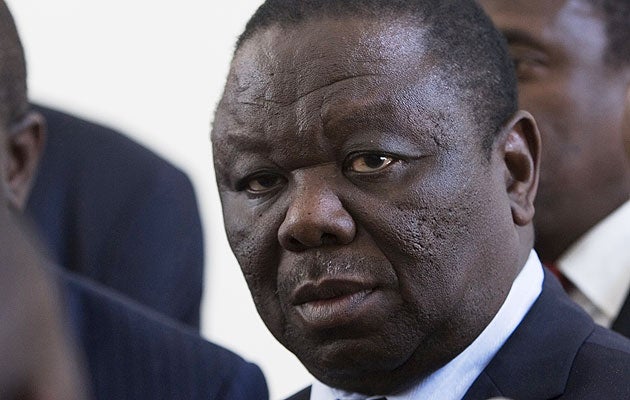South Africa intervenes after Tsvangirai detained at airport

Your support helps us to tell the story
From reproductive rights to climate change to Big Tech, The Independent is on the ground when the story is developing. Whether it's investigating the financials of Elon Musk's pro-Trump PAC or producing our latest documentary, 'The A Word', which shines a light on the American women fighting for reproductive rights, we know how important it is to parse out the facts from the messaging.
At such a critical moment in US history, we need reporters on the ground. Your donation allows us to keep sending journalists to speak to both sides of the story.
The Independent is trusted by Americans across the entire political spectrum. And unlike many other quality news outlets, we choose not to lock Americans out of our reporting and analysis with paywalls. We believe quality journalism should be available to everyone, paid for by those who can afford it.
Your support makes all the difference.Morgan Tsvangirai briefly became a prisoner in his own country when his travel documents were confiscated at Harare airport. They were returned a few hours later, but only after South Africa intervened.
Mr Tsvangirai, leader of the Movement for Democratic Change, and the party's secretary general, Tendai Biti, were due to board a lunch-time flight to Johannesburg to attend a summit of regional leaders tomorrow. Mr Biti was the chief negotiator in the power-sharing talks which collapsed earlier this week.
At Harare International Airport, Mr Tsvangirai's emergency travel document, which was issued only a fortnight ago, was taken from him. Officials also took his old passport, which is no longer valid but which he always carries with him.
By mid-afternoon, an MDC spokesman, George Sibosithwe, confirmed that the documents had been returned: "Passports have been returned for all of them, but no reason has been given as to why they had been taken."
The South African government confirmed that it had intervened on Mr Tsvangirai's behalf. "We heard that they had prevented them from travelling," said President Thabo Mbeki's spokesman, Mukoni Ratshitanga. "And we spoke to the Zimbabwean officials who assured us that they will allow them to travel."
The MDC says that yesterday's affair calls into question Robert Mugabe's commitment to a negotiated settlement. The party immediately called on the Southern African Development Community (SADC) to take a tough stance on the 84-year-old autocrat when the heads of state meet this weekend. A statement issued by the party said that "Mugabe continues to preach dialogue and to act war". They appealed to the SADC to get tough with him.
Mr Mugabe is due to join his fellow leaders at the two-day summit. However, with the future of Zimbabwe and how to deal with it likely to dominate the agenda, following the collapse of the talks, Mr Mugabe's presence will be uncomfortable.
The talks became deadlocked when Mr Tsvangirai refused to accept a junior partnership in Mr Mugabe's government. He claimed that, as the majority winner in the general election on 29 March, he is entitled to lead the country through a transition period until constitutional reform paves the way for a new round of free and fair elections. His party says that only then can the legitimate leader of the country be determined.
However, Mr Mugabe is refusing to play "Queen in the Zimbabwean body politic", according to his spokesman, George Charamba. Soon after the collapse of the talks, word emerged that Mr Mugabe was courting Arthur Mutambara, the leader of the breakaway faction of the MDC, to join him in a coalition government. Despite Mr Mutambara's insistence that this was not the case, yesterday's edition of the state-owned Herald stated the contrary. It reported that the incumbent President and faction leader had found a middle ground on a number of issues, "paving the way for Comrade Mugabe to form a new government for the seventh parliament to start sitting following elections held earlier in the year".
Such a scenario would not bode well for the beleaguered country as Western donors would withhold the billions of pounds of aid money that is needed to rescue Zimbabwe's fractured economy.
Join our commenting forum
Join thought-provoking conversations, follow other Independent readers and see their replies
Comments